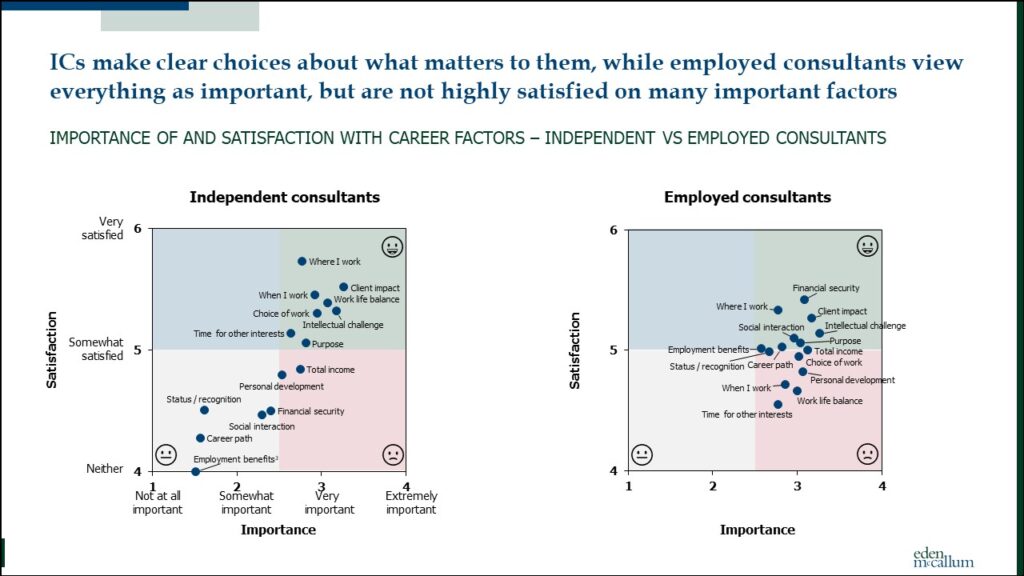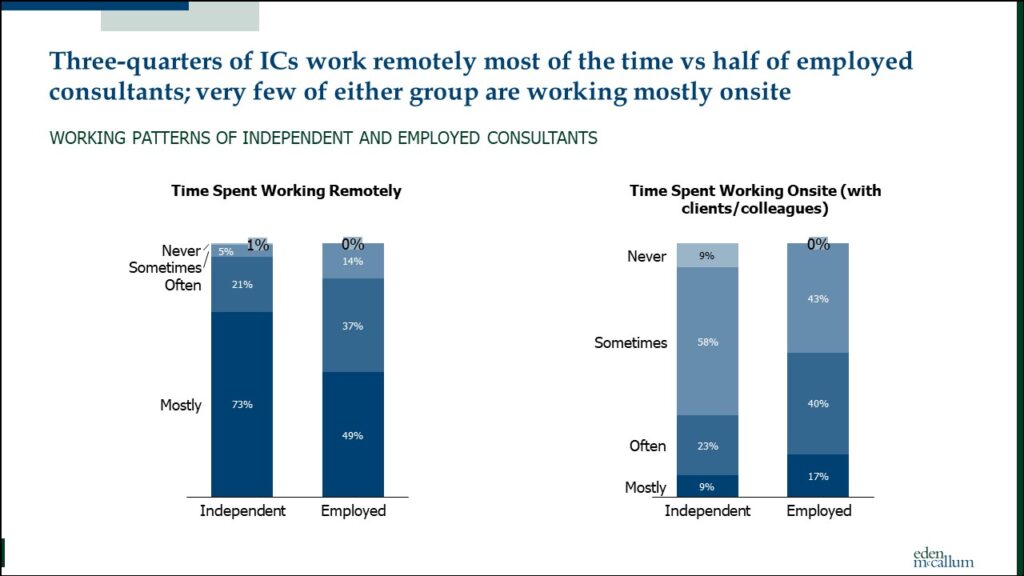Eden McCallum Consultant Survey Insights
10 February 2023
Eden McCallum’s biannual consultant survey, conducted with London Business School, explores the career choices and satisfaction of management consultants. We surveyed around 500 consultants, both those who are working as independent consultants (ICs) and those employed by traditional firms.
A number of findings stand out in the latest research.
ICs continue to find working life extremely rewarding, in terms of professional satisfaction, work-life balance and financial reward, and are more satisfied than their employed peers. Younger ICs (under 40) and women are especially content with this career choice.
Client impact is a strong positive for ICs, who find their work has higher impact, is more efficient, and offers better value for clients than working in the traditional model. They also find independent work to be more collaborative and more enjoyable. Beyond the work itself, ICs especially value their work-life balance and having choice over their assignments.
Employed consultants’ satisfaction on a number of factors has improved since pre-pandemic days, suggesting that some of the recent shifts in working patterns (e.g., more remote working) are having a positive impact on them; it remains to be seen whether these changes will last.
In general ICs seem to have adapted well to the new world of hybrid working, finding it more efficient and productive; and most (7 in 10) expect it to continue.
The survey in more detail
Our respondents’ consulting work assignments predominantly include strategy, transformation, performance improvement, and due diligence/M&A. They are seeing increasing demand for consulting generally, and particularly in data science, ESG, and digital strategy and transformation.
Demand for their services is robust: 7 in 10 ICs say they worked the same or more days in 2022 vs 2021, and 8 in 10 expect to work as many or more days in 2023.

The consulting industry has not been immune to inflation: day rates increased for around a third of ICs in 2022 compared with the previous year and nearly half expect their day rate to be higher again in 2023.
Despite working only 170 days per year on average (of which c. 135 are billed), two-thirds of ICs earn the same or more compared with their pay when employed full-time. This number has been roughly the same since 2018.
Strikingly, women are more likely than men to be earning more as an independent consultant. Nearly half of women say they earn more as an independent, compared to 4 in 10 men. Younger consultants also do better in this market: 7 in 10 under 40s earn more as an IC compared with 4 in 10 over 40s.

Career choices and job satisfaction
Independent consulting is now firmly established not merely as a viable long-term career but as a distinctly positive choice. This represents a significant shift over the past 20 years: in 2002 when we first asked, only a third of respondents saw themselves remaining as an IC for more than 3 years. A decade later, in 2011, 56% saw a longer term future as an IC. Today nearly 7 in 10 do. Enabling that is a broad range of sources of work – most ICs find their work from a mix of third party firms, traditional consulting firms and directly with clients.

Satisfaction with their professional lives supports this shift. More ICs are extremely or very satisfied with their careers – 58% said so in our survey, while for employed consultants the equivalent figure was 53% – and overall satisfaction (85%) has returned to pre-pandemic levels.
Employed consultants have benefited from changes in their working practices, reflecting some of the advantages being enjoyed by ICs. Satisfaction has increased since pre-pandemic days on choice of where and when they work, and work life balance, though satisfaction remains significantly lower than that of ICs on these factors.
Exploring this further, it is clear that ICs make deliberate choices about the things that are important and not important in their careers, and are highly satisfied with the factors that matter most: their impact with clients, the intellectual challenge of projects, work/life balance, and control (where, when and on which assignments they work).
In contrast, employed consultants view almost every element as important, but are not highly satisfied on many of their most important factors.
As one Eden McCallum IC described it: “Ultimately, I took all the great elements of the job I had at a traditional firm, and stripped out the elements I didn’t like, and all of a sudden I have the best job.”

Women are generally more satisfied than men, particularly with the most important factors in their careers. ICs under 40 are also more satisfied across a range of career criteria than over 40s.
Independent consulting work and clients
ICs believe this way of working is not only better for them, but for clients as well. 90% of ICs believe that their work provides better value for money than traditional consulting, and a large majority (66-85%) also believe their work is higher impact, more efficient, and more likely to be implemented, as well as being more collaborative and enjoyable.
One Eden McCallum IC observed: “We had people from all the big firms in our team, and the thinking was so rich. It’s not just being smart, it’s also having different backgrounds, different frameworks from the company you worked with before – if you put all of that together, it makes a super strong team.”

New ways of working
The pandemic has forced everyone to reflect on how they work and what might now need to change. For ICs, however, adapting to changing times has been more straightforward then for traditionally employed consultants. Currently, 73% of ICs work remotely most of the time, compared with 49% of employed consultants. Employed consultants are more likely than ICs to be spending a greater amount of time working remotely now than before the pandemic, and also more likely to think this trend will reverse in the future.

Independence of outlook can support greater success and client satisfaction. When asked who is driving the decision on where to work, ICs’ decisions are more client-driven than employed consultants’ (70% compared with 58%), while for the latter, their own firm is a significant factor. Both groups are also highly driven by personal preference.
The two groups’ views on the positives and negatives of WFH have interesting similarities and yet some differences. The top 3 benefits that both cite from working from home are related to having extra time (less commuting, more flexibility, more time with the family); the top 2 downsides are related to reduced social contact (with clients and colleagues). ICs however are more likely to believe that WFH is more productive, while employed consultants find it harder to switch off at the end of the day.

Dena McCallum, co-founder of Eden McCallum, says it is pleasing to see independent consulting being recognised as a valuable and rewarding career, and delivering so well for clients. “20 years ago, Liann Eden and I backed our hunch that there could be a better way – on the client side and also among consultants – to deliver consultancy. The satisfaction we hear from our clients and see in this consultant research are hugely rewarding affirmation that this hunch was right.”
To view a highlight of our results, click here.
Follow us on LinkedIn to remain updated.

